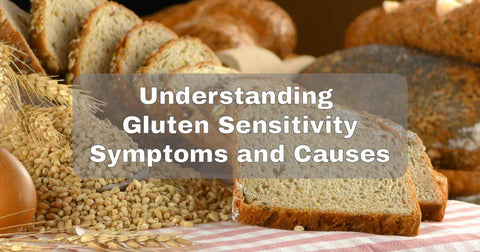Gluten sensitivity is the body's adverse reaction to gluten, a protein found in wheat, barley, and rye. This sensitivity varies in intensity, ranging from mild discomfort to severe manifestations affecting different bodily systems.
Distinguishing between gluten sensitivity, celiac disease, and wheat allergy is crucial. While these conditions share similarities, they differ significantly in their immune responses and health implications.
This article focuses on exploring gluten sensitivity, its diverse symptoms, and underlying causes. Recognizing these aspects is essential for effective management of this condition.
Gluten is found in many everyday foods, and the increasing prevalence of gluten sensitivity necessitates a closer examination of its symptoms and causes. By exploring the causes of gluten sensitivity, this article aims to equip readers with a deeper understanding of its symptoms and origins.
What is Gluten Sensitivity?

Gluten sensitivity is an adverse reaction to gluten, a protein found in wheat, barley, rye, and related products. Unlike celiac disease, which triggers an immune response damaging the small intestine, gluten sensitivity manifests without these immune mechanisms.
Gluten, comprising gliadin and glutenin, serves as a binding agent in food, imparting elasticity to dough and texture to baked goods. It's not confined to bread but lurks in various processed foods like pasta, cereals, sauces, and unexpected items such as soups or dressings.
Distinguishing Gluten Sensitivity
Unlike celiac disease and wheat allergy, gluten sensitivity doesn't involve immune reactions damaging the intestines or triggering specific allergic responses. Instead, it induces a range of symptoms without the autoimmune or allergic pathways.
Spectrum of Gluten Sensitivity
Gluten sensitivity varies in intensity, from mild to severe reactions. Some experience symptoms less severe than celiac disease but impactful enough to affect health. Understanding this spectrum helps recognize diverse gluten-related issues beyond celiac disease or wheat allergy.
Rising awareness and advancements in testing methods have led to increased recognition and diagnosis of gluten sensitivity. Distinguishing between celiac disease, wheat allergy, and gluten sensitivity is crucial for accurate diagnosis and effective management.
Symptoms of Gluten Sensitivity
Gluten sensitivity manifests through a range of symptoms that primarily affect the gastrointestinal system but can also extend to various other parts of the body.
Gluten sensitivity can trigger an array of symptoms that encompass not only the gastrointestinal tract but also various other bodily systems.
Digestive Symptoms
- Abdominal Discomfort and Bloating
Upon consuming gluten, individuals often encounter abdominal discomfort, characterized by sensations of pain, cramping, and bloating. These discomforts might fluctuate in intensity, persisting for hours or even days post-consumption.
- Altered Bowel Patterns
Frequent disturbances in bowel movements, such as diarrhea or constipation, are prevalent among those sensitive to gluten. These irregularities often follow gluten ingestion and can endure for an extended duration, impacting daily routines.
Non-Digestive Symptoms

- Fatigue and Persistent Lethargy
Gluten sensitivity isn't limited to the digestive system; it can induce chronic fatigue and persistent lethargy, affecting individuals even after sufficient rest. Such fatigue can hinder daily activities and significantly diminish overall energy levels.
- Headaches and Migraines
Many report recurrent headaches or migraines triggered by gluten consumption. These episodes can vary in severity and frequency, complicating the diagnosis due to their resemblance to other types of headaches.
- Joint Pain and Inflammation
For some individuals, gluten sensitivity manifests as unexplained joint pain, stiffness, or inflammation. These symptoms, without an apparent cause, might point to gluten sensitivity and warrant further evaluation.
- Skin Issues: Eczema and Dermatitis Herpetiformis
Sensitive individuals might develop skin complications like eczema or dermatitis herpetiformis following gluten intake. Dermatitis herpetiformis, characterized by itchy, blistering rashes, is particularly associated with gluten sensitivity.
Identifying these diverse symptoms is vital in recognizing potential gluten sensitivity. However, diagnosing it solely based on symptoms can be complex. These manifestations, while commonly linked to gluten intake, can also be influenced by various other factors, making accurate diagnosis challenging without proper evaluation and testing by healthcare professionals.
Causes and Triggers of Gluten Sensitivity
Genetic Susceptibility
Genetic predisposition is a key factor influencing gluten sensitivity. Specific variations in the HLA-DQ genes have been identified as strong indicators of susceptibility to gluten-related disorders. However, it's crucial to note that not everyone carrying these genetic markers will necessarily develop gluten sensitivity. While these genetic variations increase vulnerability, other environmental and physiological factors also play significant roles.
Gut Health and the Role of Intestinal Permeability
 Maintaining a healthy gastrointestinal tract is critical in modulating immune responses, including those triggered by gluten. Studies indicate that disturbances in gut health, particularly increased intestinal permeability often referred to as "leaky gut," can contribute to the onset or exacerbation of gluten sensitivity. When the integrity of the intestinal barrier is compromised, it allows for greater interaction between gluten proteins and the immune system, potentially leading to adverse reactions.
Maintaining a healthy gastrointestinal tract is critical in modulating immune responses, including those triggered by gluten. Studies indicate that disturbances in gut health, particularly increased intestinal permeability often referred to as "leaky gut," can contribute to the onset or exacerbation of gluten sensitivity. When the integrity of the intestinal barrier is compromised, it allows for greater interaction between gluten proteins and the immune system, potentially leading to adverse reactions.
Environmental Triggers and Contributing Factors
A spectrum of environmental factors can act as triggers or exacerbate gluten sensitivity in susceptible individuals. Gastrointestinal infections, for instance, have been linked to initiating or intensifying immune responses against gluten. Furthermore, traumatic events or high-stress situations might serve as triggers, although the precise mechanisms by which these events contribute to gluten sensitivity are still subjects of ongoing research.
Immune System Involvement and Inflammation
While gluten sensitivity doesn't provoke the same autoimmune response observed in celiac disease, the immune system likely plays a role in its manifestation. However, the exact immune mechanisms driving gluten sensitivity remain elusive. Hypotheses suggest that certain components within gluten might incite an immune reaction or induce inflammation in genetically susceptible individuals. These immune responses could lead to the diverse array of symptoms commonly associated with gluten sensitivity.
Understanding the relationship between genetic predisposition, gut health, environmental triggers, and immune responses is crucial in unraveling the complexities of gluten sensitivity. Many researchers aim to understand the precise mechanisms involved, offering insights into better diagnostic methods and more targeted interventions for those affected by gluten-related disorders.
Diagnosis of Gluten Sensitivity
Diagnosing gluten sensitivity can be challenging due to the absence of specific biomarkers and standardized tests. However, several methods are used to identify and confirm gluten sensitivity, focusing on symptomatology, dietary changes, and certain clinical tests.
Understanding the Symptoms
- Symptom Assessment: Diagnosis often begins with a thorough evaluation of symptoms associated with gluten sensitivity. These may encompass gastrointestinal issues like abdominal pain, bloating, diarrhea, or constipation, along with non-digestive symptoms such as fatigue, headaches, joint pain, and skin problems like eczema.
- Observation through Elimination Diet: One common approach involves an elimination diet where gluten-containing foods are eliminated from the diet for a defined period. Monitoring symptom improvements during this period can indicate sensitivity to gluten.
Diagnostic Methods

- Blood Tests: While no definitive blood test exists for gluten sensitivity, certain antibodies like anti-gliadin antibodies (AGA) or tissue transglutaminase antibodies (tTG-IgA) might be elevated, indicating a potential sensitivity. However, these markers are not exclusive to gluten sensitivity and can also be found in other conditions.
- Biopsy and Clinical Tests: In some cases, an intestinal biopsy may be recommended to assess damage to the small intestine, resembling that seen in celiac disease. However, this method is less frequently used for diagnosing gluten sensitivity due to less pronounced intestinal damage.
- Clinical Response to Gluten-Free Diet: Perhaps the most telling diagnostic tool is the response to a gluten-free diet. If symptoms improve or disappear after removing gluten from the diet and reappear upon reintroduction, it strongly suggests gluten sensitivity.
Challenges in Diagnosis
- Overlap of Symptoms: The symptoms of gluten sensitivity often overlap with various other gastrointestinal disorders, making it challenging to pinpoint the exact cause solely based on symptoms.
- Inconclusive Tests: Diagnostic tests for gluten sensitivity may yield inconclusive results or false negatives, complicating the diagnostic process.
- Individual Variability: Sensitivity to gluten varies among individuals, and some may experience symptoms without showing positive test results.
Managing Gluten Sensitivity
Gluten-Free Diet as the Primary Treatment
The cornerstone of managing gluten sensitivity is adopting a strict gluten-free diet. This involves eliminating all sources of gluten-containing foods, including wheat, barley, and rye. Individuals with gluten sensitivity must scrutinize food labels, as gluten can hide in various processed foods and unexpected products.
Key Components of a Gluten-Free Diet:
- Naturally Gluten-Free Foods: Emphasize whole, unprocessed foods such as fruits, vegetables, lean meats, fish, eggs, legumes, nuts, and dairy products.
- Gluten-Free Grains: Incorporate gluten-free alternatives like quinoa, rice, corn, and gluten-free oats.
- Avoidance of Cross-Contamination: Prevent cross-contact by using separate cooking utensils, cutting boards, and kitchen equipment to avoid accidental exposure to gluten.
Challenges and Nuances of Adopting a Gluten-Free Lifestyle
Transitioning to a gluten-free lifestyle can pose significant challenges, both socially and practically. Dining out, attending social gatherings, and traveling requires careful planning to ensure adherence to a gluten-free diet. Additionally, gluten-free alternatives might lack certain nutrients and fiber found in gluten-containing foods, necessitating conscious efforts to maintain a balanced diet.
Importance of Consulting Healthcare Professionals for Guidance

Seeking guidance from healthcare professionals, particularly dietitians specializing in gluten-related disorders, is crucial for effective management. They provide personalized guidance, help navigate dietary restrictions, and ensure nutritional adequacy while avoiding gluten-containing foods.
Potential Complications of Untreated Gluten Sensitivity
Failure to adhere to a gluten-free diet can lead to various health complications, including persistent gastrointestinal symptoms, nutrient deficiencies (such as iron, calcium, and B vitamins), and long-term intestinal damage. Moreover, untreated gluten sensitivity may increase the risk of developing other autoimmune conditions and gastrointestinal disorders.
Managing gluten sensitivity requires strict adherence to a gluten-free diet, continuous education, and ongoing support from healthcare providers. While it presents challenges, with proper guidance and commitment, individuals can effectively manage gluten sensitivity and improve their overall health and quality of life.
Conclusion
Understanding gluten sensitivity is crucial in navigating the complexities of dietary health and addressing various symptoms that might otherwise go undiagnosed. Here, we've explored the key facets surrounding gluten sensitivity, shedding light on its symptoms, causes, diagnosis, and management.
Gluten sensitivity, distinct from celiac disease and wheat allergy, manifests through an array of symptoms, encompassing gastrointestinal distress like abdominal pain, bloating, and irregular bowel movements, as well as non-digestive issues such as fatigue, headaches, joint pain, and skin conditions like eczema.
Diagnosing gluten sensitivity presents challenges due to the absence of definitive tests. However, approaches like elimination diets, blood tests for specific biomarkers, and, in certain cases, intestinal biopsies aid in confirming sensitivity to gluten. An alternative convenient yet accurate method to know if you are sensitive to gluten are at-home food intolerance test kits such as those provided by Advance Food Intolerance Labs.
Watch AFIL test kits testimonial videos click here
References:
- Volta, Umberto, and Roberto De Giorgio. "New understanding of gluten sensitivity." Nature Reviews Gastroenterology & Hepatology 9.5 (2012): 295-299.
- Leonard, Maureen M., et al. "Celiac disease and nonceliac gluten sensitivity: a review." Jama 318.7 (2017): 647-656.
- Catassi, Carlo. "Gluten sensitivity." Annals of nutrition and metabolism 67.Suppl. 2 (2015): 15-26.
- Roszkowska, Anna, et al. "Non-celiac gluten sensitivity: a review." Medicina 55.6 (2019): 222.
- Elli, Luca, et al. "Evidence for the presence of non-celiac gluten sensitivity in patients with functional gastrointestinal symptoms: results from a multicenter randomized double-blind placebo-controlled gluten challenge." Nutrients 8.2 (2016): 84.
- Vazquez-Roque, Maria, and Amy S. Oxentenko. "Nonceliac gluten sensitivity." Mayo clinic proceedings. Vol. 90. No. 9. Elsevier, 2015.


.png?v=1737390083)
.png?v=1737187409)


